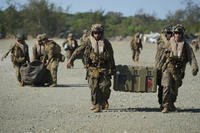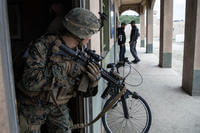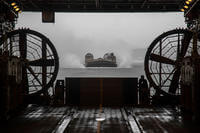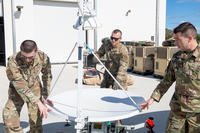I had the privilege of sitting in on a fascinating think session today put together by the U.S. Army focusing on future scenarios that could have serious impacts on U.S. national security in the coming decades and well, the role multinational corporations might play in those scenarios was one of the more interesting topics attendees were asked to look at.
Dubbed the Alternative Futures Symposium, the event asked mid-level officers and civilians from the U.S. Army and several other services and nations to look at what types of contingencies the U.S. may have to plan for in the event of a complete global economic collapse, the continued rise of Asia as an economic and political powerhouse and the proliferation of advanced military technology eroding the massive advantage U.S. forces have enjoyed for decades. Their conclusions will ultimately be included in the Unified Quest program which is meant to challenge and inform the Army's various "concepts" it uses to help shape itself to fight future wars.
All these events were examined through the lens of current trends that are rapidly changing the world, from climate change and terrorism to demographic shifts, developments in computing technology and potential for fights over natural resources. However, one of the most interesting trends that participants were asked to consider in their debates about future threats was that of the growing power of multinational corporations.
The Center for Strategic and International Studies' Karen Meacham gave a presentation before before participants dove into the issues asking attendees to consider seven "revolutions" likely to occur in the coming decades and how they may shape the 21st Century security environment. One of these revolutions was the multinational corporation as an even bigger player in geopolitics than it already is.
Of the 50 largest economies in the world right now, seven are multinational corporation, according to Meacham. With this trend looking like it will continue to grow, these corporations may become "almost equal to governments," Meacham said. This means that, "in some cases, they need to figure out what they stand for."
"We're now well beyond the Westphalian" system of nation-state-centered government, Meacham added, noting the challenge to governance these corporations will present.
And the trend of non-state actors becoming more and more influential isn't limited to corporations. In recent years, The Bill and Melinda Gates Foundation gave more grant money around the planet than the entire budget of the World Health Organization, according to Meacham. "Therefore, the influence they wield is staggering," she said.
She ended her talk on the rise of multinational organizations by quoting Henry Kissenger (love him or hate him) as saying that governments must figure out how to balance the globalized economy and its multinationals with the traditional nation state construct.
One conference attendee raised another interesting angle to the multinational debate: Where do the loyalties of these extremely powerful corporations lie when their leadership is distributed around the globe? The attendee also raised the spectre of terrorists getting jobs in one of these corporations in order to infiltrate a country they seek to harm. (He, like most attendees, was speaking under Chatham House rules to encourage candid debate on a wide range of ideas.)
While massive companies influencing world affairs is nothing new, just look at the British East India Company or today's energy companies, the number of new ones rising around the world today is. It's interesting to see multinational corporations being looked at by the most powerful Army on Earth as it works to inform its future doctrine and operational concepts. Can't wait to see the results of this session.
-- John Reed









